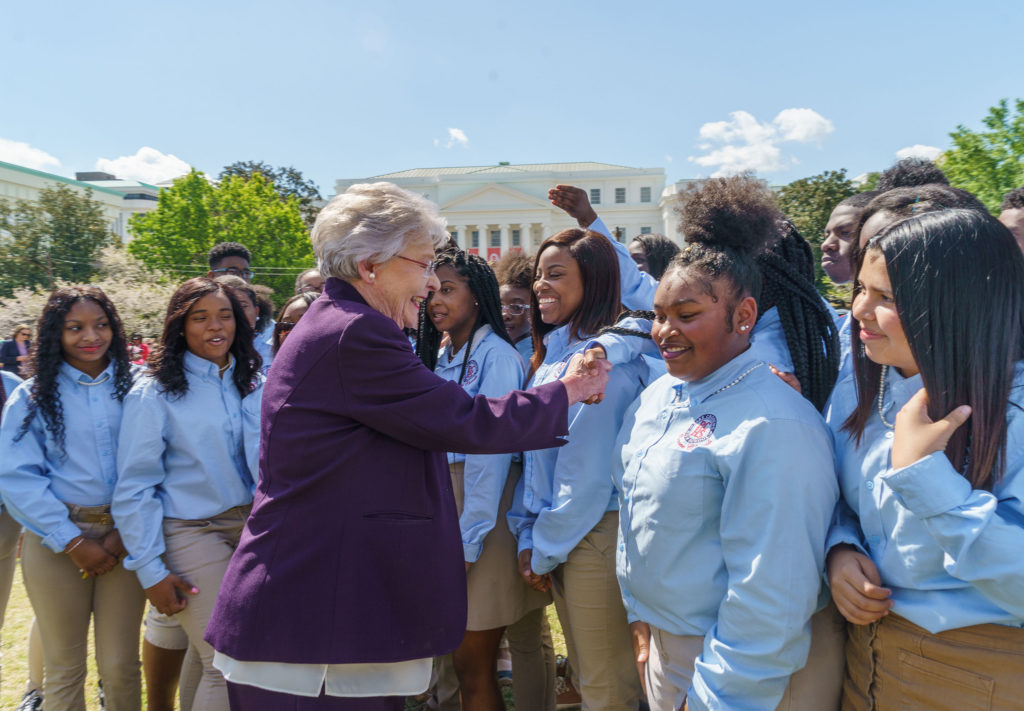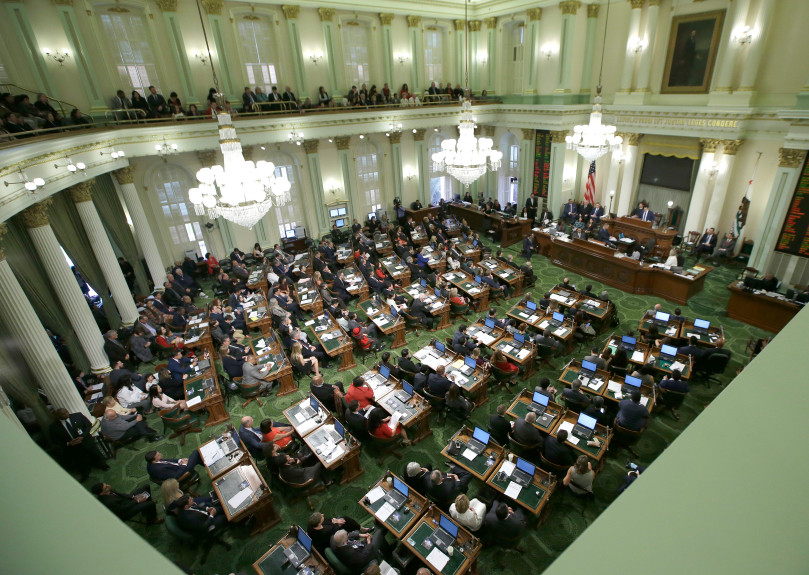Kay Ivey calls for ‘all kids’ to be counted in 2020 Census

Alabama has a lot at stake in the 2020 U.S. Census — from a seat in the U.S. House of Representative to a vote in the Electoral College, as well as federal funds — depending on participation levels and what the results indicate. Which is why Gov. Kay Ivey on Tuesday joined hundreds of children ranging in age from infants through 12-grade students as they rallied on the South Lawn of the Alabama State Capitol Building on Tuesday to encourage state leaders to prioritize the well-being of Alabama’s children by counting all kids in the state’s 2020 census. Parents, pediatricians and other advocates for children also participated. Rallygoers warned if Alabama does not accurately record the number of individuals living here, the state could miss out on tens-of-millions of dollars in federal aid needed to adequately support programs for children and families. In 2010, Alabama only accounted for 72 percent of its estimated population. As a result, advocates noted that the state received far less in federal assistance than it needed due to the low count. To ensure the state gets its fair share of moving forward, participants called on state lawmakers to appropriate the funding and resources needed to guarantee an accurate and complete count in the 2020 census. “The vision of Alabama’s youngest citizens is ultimately what will drive our state and nation forward. Whatever our students dream to do, we must provide them the tools to be successful,” Ivey said at the rally. “As part of Child Advocacy Day this year, I was proud to remind citizens across the state that we have an opportunity to protect very important education dollars by participating in the 2020 Census. The kids must count today in order for Alabama to count tomorrow. To invest in our future, we must first invest in education.” Ivey was joined by Del Marsh, the President Pro Tempore of the Alabama State Senate; Mac McCutcheon, the Speaker of the Alabama State House of Representatives; and Montgomery Mayor Todd Strange. VOICES for Alabama’s Children VOICES for Alabama’s Children convened Tuesday’s rally as part of its annual Kids Count Advocacy Day activities. The American Academy of Pediatrics – Alabama Chapter, Alabama PTA and Children’s of Alabama joined VOICES as co-hosts and organizers. “Alabama is leaving federal aid on the table because of a low count in the 2010 census,” said Stephen Woerner, the executive director of VOICES for Alabama’s Children. “The failure to count all of our residents, including our children, makes paying for the services the state provides to address the health, safety, education, and overall quality of life for children very difficult. We owe it to our children to make sure all are counted.” The Alabama Kids Count Rally was part of a full day of activities organized by VOICES for Alabama’s Children. Immediately before the rally, VOICES hosted a forum for advocates from across the state to discuss their legislative priorities. Throughout the day, advocates visited with lawmakers to address their concerns regarding the census and other issues facing children. “The data provided by the census is incredibly important for decision makers at the state, county, and local level,” Woerner said. “VOICES believes that what gets measured, gets changed, and the better data we collect the more impactful the decisions our leaders can make for our children.”
Mike Rogers: The American people deserve to know the truth

There is nothing more fundamental to our Republic than free elections, equal justice under the law, and honest government. Any threat to them can shake the foundations of our Constitution. Recently, some very disturbing information about the actions of a few high- ranking officials at the FBI and Justice Department has come to light. This information describes an effort to use the most sensitive law enforcement techniques to discredit and potentially nullify the 2016 election. We’ve all heard by now about the shady Steele dossier. We are learning the Democratic National Committee (DNC) and possibly even some officials at the FBI were behind the dossier. Then that same unreliable information was used by the FBI to get a secretive surveillance warrant to spy on the Trump campaign – or in other words, a warrant to spy on fellow Americans for political purposes. We have also learned of a small group of senior FBI officials seemingly scheming to get Donald Trump. Talks of an “insurance plan” against Mr. Trump, of secret “offsite” meetings and over 50,000 texts over 50,000 missing text messages many of which highlighted these efforts. And remember one week we are told the 50,000 texts were forever lost due to a technical error and the next week we are told the FBI Inspector General was able to recover them. Sounds a lot like missing emails doesn’t it? There is growing interest in the public release of a four-page document written by my colleague, Congressman Devin Nunes (CA) who serves as Chairman of the House Intelligence Committee that outlines many of these suspicious actions. Especially the potentially illegal use of the Foreign Intelligence Surveillance Act (FISA) to spy on President Trump. This document, which I had the opportunity to read in secured area in the U.S. Capitol, was very troubling to me. The memo must be released to the public. The American people have the right to know the truth. ••• Mike Rogers is a member of U.S. Congress representing Alabama’s 3rd Congressional District. Sign-up for his e-Newsletter by visiting www.mikerogers.house.gov. To stay up to date, you can also like him on Facebook at Congressman Mike D. Rogers, follow him on Twitter, Pinterest and Instagram at RepMikeRogersAL, on Tumblr at www.repmikerogersal.tumblr.com.
Jim Zeigler asks legal fees be halted until Robert Bentley impeachment resumes

Alabama Auditor Jim Zeigler has asked the state’s Contract Review Committee to delay a contract for legal services for the impeachment investigation of Gov. Robert Bentley. The investigation was halted at the request of then-attorney general Luther Strange on Nov. 3. Zeigler says the proposed $160,000 contract would be an additional payment to the Birmingham law firm of Lightfoot Franklin & White LLC for its outside representation and doesn’t need to be paid until the impeachment investigation resumes. If paid, the contract would make the total legal payments to investigate the governor total $350,000. The contract review panel is scheduled to Thursday, March 2 to review proposed contracts from state agencies. “Right now, the people of Alabama are being hit with costs of an impeachment investigation, but no investigation is being done. All cost – no investigation. That is unacceptable,” Zeigler said Tuesday. “Please delay approval of this contract until the impeachment is actually resumed. It is frustrating for the people of Alabama that the impeachment investigation has been halted but the legal cost to taxpayers is continuing. New Alabama Attorney General Steve Marshall has confirmed Bentley is still under investigation, recused himself accordingly, and appointed former Montgomery District Attorney Ellen Brooks as special prosecutor. “The continuing legal cost is concerning because the impeachment investigation is not continuing,” Zeigler continued. “House Judiciary Chairman, Rep. Mike Jones, said on Feb. 15 that he is waiting on clearance from new Special Prosecutor Ellen Brooks for the impeachment investigation to resume.” The House impeachment investigation began in the 2016 legislative session when 23 House members signed an impeachment resolution. It was referred to the House Judiciary Committee and made little progress before Chairman Jones halted it at the request of Strange Nov. 3. Below is Zeigler’s request to the Contract Review Committee.
Donald Trump presidency puts California Legislature in defense mode

As California lawmakers return to Sacramento on Wednesday, liberal dreams of expanding safety-net benefits and providing health coverage to immigrants are giving way to a new vision revolving around a feverish push to protect gains racked up in the past. After years of pushing forward a progressive agenda, legislative Democrats will be pushing back against conservative policies from President-elect Donald Trump and the Republican Congress. Instead of expanding Medi-Cal health coverage to adult immigrants who can’t prove they’re legally in the country, Democrats are now concentrating on how to retain health coverage for those who already have it. And anti-poverty groups are focused on preventing cuts to food stamp and welfare programs rather than trying to expand them as planned. “There is so much uncertainty at the federal level, because they’re talking about some really drastic policy choices that could have a really negative impact on California,” said Scott Graves, research director for the California Budget & Policy Center, a left-leaning research group. Last year was a particularly effective one for California liberals. The Legislature extended the nation’s most ambitious climate change programs, raised the minimum wage to $15 and toughened gun laws. Lawmakers boosted overtime for farmworkers, expanded welfare benefits and enacted a sweeping array of anti-tobacco measures. This year had all the makings of continuing the trend. Democrats will arrive Wednesday with supermajorities in both chambers – enough to advance their own agenda without GOP interference if they stand united. Notably, though, Democrats took their first action as a supermajority not to advance a contentious public policy objective but to send a message to Trump. Right after they took the oath of office last month, Democrats in the Assembly and Senate suspended legislative rules to immediately approve resolutions urging the incoming administration to keep a program allowing hundreds of thousands of young immigrants who are in the country illegally to stay. While the California Legislature has broad authority to chart its own agenda, it relies significantly on federal dollars. According to the state Department of Finance, California gets $96 billion from the federal government, a figure almost as large as the state’s $122 billion general fund. Those federal funds cover a massive share of the budget for health care, food stamps, welfare and other safety-net programs. Liberals are particularly worried that the budget prepared by U.S. House Speaker Paul Ryan, R-Wisconsin, will lead to severe cuts in those programs through block grants or other methods of shifting responsibility to states, while also giving them more flexibility. “Block granting … is just not what’s in the best interests of the recipients of those programs,” said Sen. Holly Mitchell, a Los Angeles Democrat who will lead the state budget committee next year. “We’re dealing with hungry people, which we cannot ignore.” Graves noted that before the election, he hoped the Legislature would take a serious look at boosting subsidized child care and Supplemental Security Income payments for seniors and people with disabilities. That seems less likely now. Congressional Republicans also are eager to repeal President Barack Obama‘s health care overhaul, which provides $20 billion for the Medi-Cal program and private insurance subsidies. Preserving that coverage, much less expanding it to cover more people, would be extremely expensive. The California Endowment has provided millions of dollars for an advocacy campaign called Health4All to expand Medi-Cal coverage for immigrants who can’t prove they’re legally in the United States. In December, it announced a new initiative: Fight4All. The $25 million effort reflects a shift in focus from creating new rights to defending existing ones. “A whole host of areas where significant progress has been made in California in the last five or six years or so, we feel that work is now in jeopardy,” said Dr. Tony Iton, the endowment’s senior vice president. Still, conservatives in the state aren’t optimistic that Trump’s presidency will give them a reprieve from lawmakers’ persistent push to the left. California’s Legislature is “sort of like its own nation-state,” said Tom Scott, California director of the National Federation of Independent Business, a small-business advocacy organization that often is at odds with legislative priorities including labor and environmental mandates. “Quite frankly, whatever the Trump administration does, it will not stop Gov. Brown and the state Legislature from moving forward on their political agenda,” Scott said. “So I’m on one level expecting sort of business – or un-business – as usual, and I don’t see that changing.” Republished with permission of the Associated Press.


